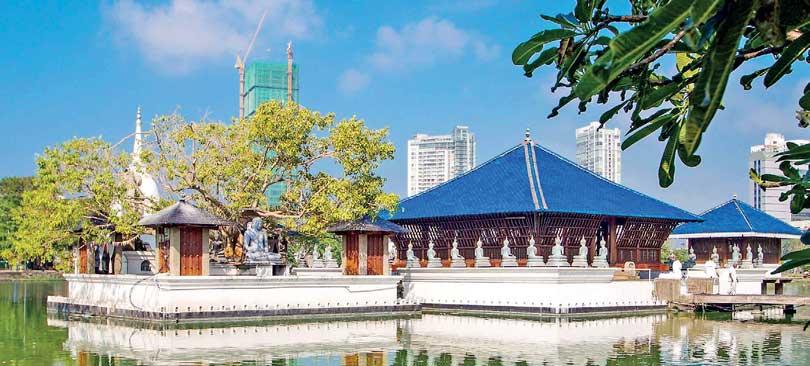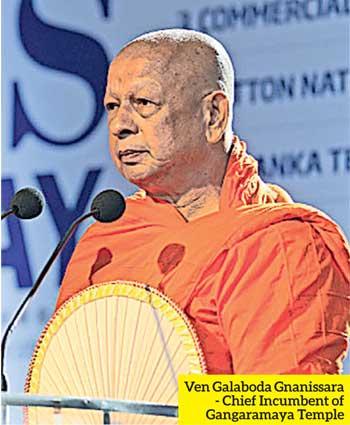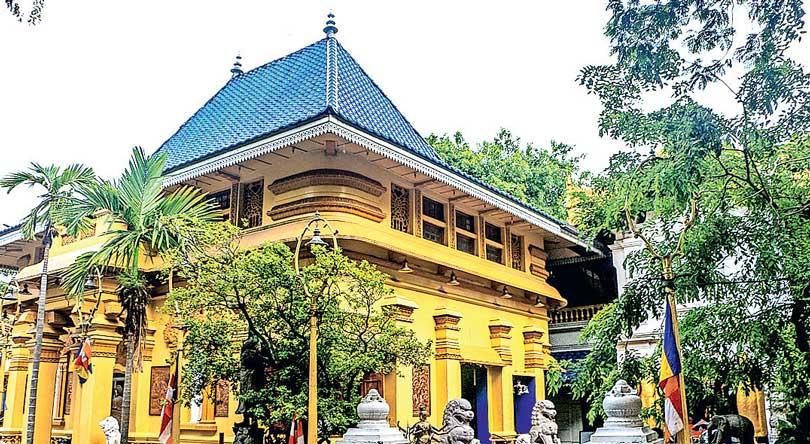Reply To:
Name - Reply Comment

 With an illustrious history of its own, the Gangaramaya Temple is a prominent place for Buddhists situated in the heart of Colombo. Albeit its magnificent presence as a place of religious worship for more than a century now, the Gangaramaya Temple plays a very dynamic role today. It is an edifice that awakens religiosity in the human spirit; fulfils a dignified role in upholding the country’s culture, while its contribution to the nation and society is a treasure of inestimable value.
With an illustrious history of its own, the Gangaramaya Temple is a prominent place for Buddhists situated in the heart of Colombo. Albeit its magnificent presence as a place of religious worship for more than a century now, the Gangaramaya Temple plays a very dynamic role today. It is an edifice that awakens religiosity in the human spirit; fulfils a dignified role in upholding the country’s culture, while its contribution to the nation and society is a treasure of inestimable value.
It is of extreme importance that this objective is disseminated among the people of Sri Lanka. It has been the desire of the Sri Jinarathana Adhyapana Palaka Sabhawa to launch a television as well as a radio channel focusing on agriculture.
Concomitantly, the Venerable Galaboda Gnanissara has also embraced this vision for a long time. As we embarked on making this vision a reality, we are extremely grateful to Dialog Sri Lanka for coming on board with us, devoid of any conditions.
Subsequently, the intervention of the President resulted in us securing a new partner in PEO TV, who has also joined hands in this endeavour. And in this backdrop, the launch of Haritha TV aims to capture and revive the once self-sufficient agriculture-centred splendour of yore, of the golden ages of the monarchs, an economy that built a strong bond between the village and the temple, the tank and the dome, the lush paddy fields and the saffron robe.
The knowledge and information disseminated through Haritha TV would include insights about the country’s traditional systems of cultivation and irrigation, and affiliated rituals while providing awareness on global agricultural practices. It is hoped that Haritha TV will also be an avenue for farmers to connect with entrepreneurs and buyers in the urban areas, an opportunity for their produce to be appreciated and valued and for self-employment among housewives.
This, one of a kind television channel will teach the children and the youth of this country its ancient culture, beliefs, rituals, and values and morals. With environmental degradation becoming a reality every day, Haritha TV is a timely entrant to disseminate knowledge among members of the future generation on the environment and its protection, the astounding technology surrounding our irrigation system and the fishing industry.
Thus, Haritha TV makes its debut in the universe of media communication as a tribute to the men and women striving through their sweat, blood and tears to make Sri Lanka self-sufficient. This is our way of listening to their stories; connect with them, become partners in their struggles and give their inestimable hard work a fillip for the future.
The temple’s magnanimous outreach in carving out a productive path for the youth of this country who have dropped out of school is indeed praiseworthy.
The Sri Jinarathana Vocational Training Institute established in 1978 by the Gangaramaya Temple, has, through its vocational training programs, guided over 600,000 youth of this country from a state of despair to hope.
The alumni of this training institute have triumphed over setbacks and are successfully employed in Japan, Korea, Hong Kong and Taiwan, while others are self-employed or become successful entrepreneurs.
Gangaramaya Temple has been sustained by successors of one of Sri Lanka’s most revered monks, the Venerable Hikkaduwe Sri Sumangala, who established the Temple and set up the great seat of Dharma education - the Vidhyodaya Pirivena.
Subsequent resident monks of the Temple, the Venerable Mahagoda Gnanissara and the Venerable Moranthuduwe Dhammananda went on to serve as Chief Priest of the Sri Pada Temple - another venerated site for Buddhists.
The Sri Jinarathana Vocational Training Institute established in 1978 by the Gangaramaya Temple, has, through its vocational training programs, guided over 600,000 youth of this country from a state of despair to hope
The Venerable Galaboda Gnanissara, the current Chief Priest of the Gangaramaya Temple, is another astute pupil and descendant of the generation of Buddhist monks who had the privilege of being moulded under the tutelage of the Temple’s great founder.
In what could be described as a first for Colombo, it was the Gangaramaya Temple that started an annual street procession to coincide with the Navam Poya Day in February, when no such exuberant event in cultural-terms was hosted in the capital.
It would not be an understatement to describe the Temple’s street procession as excessively grand, and as its reputation began spreading globally, February became a month for international tourists to make their way to Colombo to watch an intense expression of culture and religion.

Further, heightening the grandeur of Vesak, which is the foremost religious festival celebrated by the Buddhists of Sri Lanka, the Gangaramaya Temple was one of the first to put up a Pandol in Colombo, a display made out of lights illustrating a story from the 550 lives of the Buddha, which was constructed by the students of the Temple’s vocational training institute.
Over time, this exercise became so popular that it was advanced into the creation of a festival zone that allowed people to bring their creativity to the fore through a display of lanterns. The Buddha Rashmi Vesak Zone located along the banks of the famous Lake Beira has become ‘The most popular and crowded place’ during Vesak.
The Temple’s contribution to the furtherance of the Buddhist monastic order is tremendous. Providing monastic leadership to the development and betterment of the Sangha in the country, the Gangaramaya Temple has led the restoration and development of Pirivena schools, granted scholarships to young novice monks and strengthen their future role in religious service, prepared them to sit for examinations in oriental studies.
1987 marked the beginning of an impressive concept that has been a gift to Sri Lanka. When the Venerable Galaboda Gnanissara, the Chief Priest of the Gangaramaya Temple was unsuccessful in finding professional stone carvers in Sri Lanka to assist his effort to introduce a study program in stone sculpting, he embarked on a tour of Mahabalipuram in Tamil Nadu, India in search of such expertise.
Subsequently, the intervention of the President resulted in us securing a new partner in PEO TV, who has also joined hands in this endeavour. And in this backdrop, the launch of Haritha TV aims to capture and revive the once self-sufficient agriculture-centred splendour of yore, of the golden ages of the monarchs, an economy that built a strong bond between the village and the temple, the tank and the dome, the lush paddy fields and the saffron robe
What he stumbled upon during his travel has certainly been a blessing in the long-term. The unique concept of a Tree Bank which was introduced by him to the country aims to teach people the value of planting trees, such as how to plant a tree as an investment, to protect the environment and for economic empowerment. The Venerable Gnanissara provided leadership to this project by donating 900 acres of land he owned to grow trees.
Assisted by the Badrawathi Fernando Trust Fund, the tree planting program presently in progress aims to introduce in excess of 600,000 trees of mahogany, teak and agarwood.
In an effort to extend the Venerable Galaboda Gnanissara’s environmental protection initiative, a plant and seed distribution program located at the Akuressa Urumaththa Estate is engaged in distributing plants and seeds to the people living in the southern province.
It is also unique that the expensive trees planted in the 900 acres have been allocated for every family that is a trustee in the Gangaramaya Temple, who will be able to benefit economically in the event of a decline in personal fortunes.
Surrounding this central concept are several other projects that have been initiated throughout the country, such as 12 model agriculture and dairy farms spread over 100 acres of land.
The objective of this program is to elevate the people’s standard of living by introducing crops that are suitable to the soil and climate of an area and which yields produce within a short period of cultivation. Besides, the target communities in this project are provided with technology, training and fertilizer, awareness on post-harvest storage and transport and the opportunity to access markets.
During his Independence Day speech on February 4, 2021, the President emphasised his government’s thrust to develop agriculture as outlined in the Vistas of Prosperity policy document.